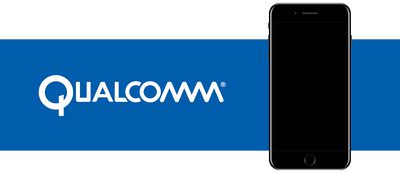In the ongoing legal feud between Apple and LTE chipmaker Qualcomm, Reuters reports today that Apple has made the latest move by filing a countersuit against Qualcomm and claiming that the supplier's Snapdragon chips -- used in many Android devices -- infringe on the Cupertino company's patents.
The countersuit is Apple's retaliation against Qualcomm after the latter company sought iPhone and iPad import bans in the United States over the summer. At the time, Qualcomm alleged that Apple infringed on six Qualcomm patents related to carrier aggregation and technologies that were designed to allow iPhones to save battery life while communicating. Apple denied any of these claims and said that Qualcomm's patents were "invalid."

Apple's new countersuit further revises its answer to Qualcomm's complaint from July by adding on the accusation of patent infringement surrounding the Snapdragon chips. The filing alleges that Apple owns "at least" eight battery life patents Qualcomm has violated, related to making sure that each part of the phone's processor draws only minimum power needed to function, powering down parts of the processor when not needed, and ensuring that sleep and wake functions work better for the user.
Apple specifically says that Qualcomm's Snapdragon 800 and 820 processors -- included in Samsung and Google smartphones -- infringe on these patents, but Apple has only named Qualcomm in its counter lawsuit. The specific monetary damages Apple is looking for were not disclosed.
Apple Inc on Thursday filed a countersuit against Qualcomm Inc, alleging that Qualcomm’s Snapdragon mobile phone chips that power a wide variety of Android-based devices infringe on Apple’s patents, the latest development in a long-running dispute.
“Apple began seeking those patents years before Qualcomm began seeking the patents it asserts against Apple in this case,” the company wrote in its complaint.
2017 has seen rebuttal after rebuttal in the Apple versus Qualcomm legal battle, kicking off in January when the FTC complained that Qualcomm had engaged in anticompetitive patent licensing practices. Soon after, Apple sued Qualcomm for $1 billion, accusing the company of charging unfair royalties for "technologies they have nothing to do with" and refusing to pay quarterly rebates. A Qualcomm countersuit followed in April, and the dispute escalated throughout the year with expanded lawsuits and claims lodged by each side.
Over the summer, Qualcomm began facing an additional lawsuit from the United States Federal Trade Commission, happening separately from the dispute with Apple but covering many of the same anticompetitive tactics that Apple claims in its own lawsuit.



















